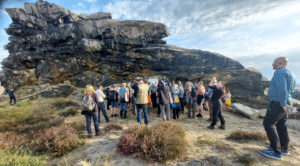INQUA 2303 my: Boosting Neotoma through the European Pollen Database (BoostEPD)
Current global changes raise pressing environmental questions linked to the loss of biodiversity and ecosystem resilience. With increasing rates of environmental changes, and rising abiotic and biotic novelty, securing the services ecosystems can provide will be a major challenge of the current century. In this context, assessing ecosystem responses to environmental changes is paramount to develop appropriate conservation, mitigation and adaptation measures.
Abstract
Palaeoecological databases have become an important research tool to explore long- term ecosystem changes at different spatial and temporal scales, far exceeding those of monitoring data, while also being important data repositories and valuable educational tools.
The European Pollen Database (EPD), one of the largest palaeoecological databases worldwide has supported science for more than 30 years, curating both pollen and associated data on and near the Eurasian continent. However, the EPD – as well as other pollen databases – lacked direct connections with other proxy-data types, which precluded exploring complex interactions between different components of ecosystems.
The database-infrastructural gap was recently filled by the Neotoma database, which allows storing different proxy data with common data standards. The EPD community participated in the development of Neotoma and joined as a constituent database completing data migration in spring 2022. Several palaeoecological communities joined in North America the Neotoma project since its launch in 2009, with for instance pollen, diatoms, ostracods, vertebrates, and testate amoebae all well represented. By contrast, in Europe the EPD largely remains the only active palaeoecological community curating open data for Europe in Neotoma.
Building on the momentum generated at a recent PAGES supported EPD Open Science Meeting (June 2022), the BoostEPD project aims at bringing members from the diverse set of paleoecological communities together and foster combined analyses of continental datasets.
BoostEPD focuses on training new Neotoma data stewards to help curate and upload

existing proxy data into new and existing constituent databases and engage with problems and particularities of other palaeoecological communities. The overall long-term goal is the integration of the diverse set of European palaeoecological data into Neotoma and their joint analysis to gain a better understanding of whole ecosystem change on the European continent during the Quaternary.
To start the process, we invited 33 scientists representing different data communities (>50% females) from ten European countries and including 12 early-career researchers at the Department of Palynology and Climate Dynamics (University of Göttingen, Germany). During the first day, the goal, major research questions and approach was discussed in three rotating break-out groups, which allowed a diversity of viewpoints to be expressed.
On the second day, we provided hands-on training for new Data Stewards to upload data into Neotoma. In addition, we included two workshops: one on data upload and stewardship and another one in the use of the NeotomaR package. The meeting was a success in many respects, as it mobilised communities (e.g. Chironomids) to join Neotoma, supported the Global Fire Database in their move towards Neotoma and stimulated the writing of a COST proposal.
Project leaders:
- Walter Finsinger, Institut des Sciences de l’Evolution de Montpellier (ISEM), France
- Graciela Gil-Romera, Pyrenean Institute of Ecology, Spain
- Vojtěch Abraham, Department of Botany, Faculty of Science, Czech Republic
- Cindy De Jonge, Department of Earth Sciences, ETH Zürich, Switzerland
- Thomas Giesecke, Department of Physical Geography, Faculty of Geoscience, The Netherlands






